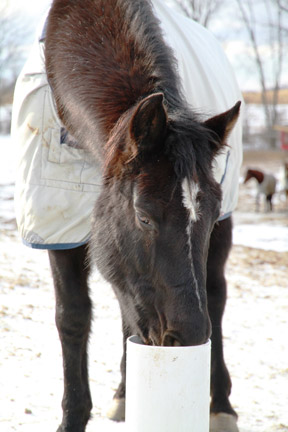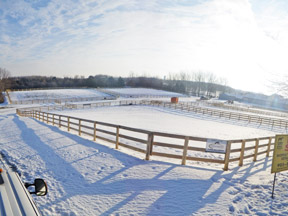
Provide shelter for your horses and keep them safe and warm at all times.
Although we have already experienced the first taste of this year’s winter, there is still time to prepare your facility for the cold Canadian weather ahead. Countless precautions and alterations can be made in order to better prepare your farm and prevent any significant damages from occurring.
Barn Structure
Firstly, begin the season by cleaning up around your facility, before even more snow comes. Thoroughly clean the interior and exterior of your barn as well as around the fields. During this time, also look for any boards, hinges, screws etc. that need to be adjusted or replaced. Inspect the outside of the barn such as the roof for leaks, holes or other damages. While up there, use this time to clean out your eaves trough from leaves, bird nests, rocks etc. Fallen leaves and other debris can accumulate in your drainage systems causing snow to back up along your foundation. If this freezes, it can generate dangerous ice dams that can significantly harm your building. More importantly while on the roof, determine its’ weight capacity in order to prevent future damages from heavy snow fall. Also, you don’t want to be left out in the dark on a cold winter’s night so be sure to check and change your outside and inside barn lights regularly. Small steps such as these can make those cold, short winter days run much more smoothly.

Drinking Post holds up in even the coldest temperatures.
Watering
An issue that we Canadians have learned to expect and deal with is freezing water. However, preventing frozen pipes can be fairly straightforward. Begin by checking all pipes and water lines for any leaks, cracks or loose footing. The pipes should be installed at least 4-6 feet underground (depending on what part of the country you live in). If your existing pipes are located above ground, they should be in a contained insulated place to avoid freezing and damages. There is also the option of insulating exposed pipes with rubber or installation tape to further prevent freezing. One of the most recommended solutions for this problem is investing in a frost free hydrant or something such as the drinking post that operates similar to a frost free hydrant. When the valve is closed, water drains back below ground level, below the frost line, consistently providing fresh water. Additionally, a water heater can be used to prevent the nuisance of breaking through ice in water troughs on a cold winter morning and can save you a lot of frustration and time.
Shelter
Providing your horses with an alternate form of shelter in the winter can make life in the cold much easier on you and them. Horses can handle quite cold temperatures however there are times when they need to get out of the wind and harsh weather. Having a run-in shed available or any other form of shelter in the paddocks can help your horses stay warm and safe in the crazy winter.

Prepare your facility before all the snow comes.
Snow and Ice
The best practice to control the constant Canadian snow is developing some sort of snow removal plan (where to put the snow, how to move it, how often you should move it etc.). When removing snow from your walkways or driveways, it is best to avoid piling it along the side of your building as it can melt in the spring and run into your barn, causing it to flood. Also, to prevent icy walkways, spreading sand, rocks, wood chips and/or salt can provide you with much better traction when walking around your facility, keeping you and your horses safer.
Worst Case Scenario
If the absolute worst happens and you become snowed in, you want to make sure there is an abundance of hay and feed to last a few days. If the power goes out, keep a lot of water stored somewhere where it will not freeze, along with other necessary materials required for you and your facility. Lastly, a generator would be an effective machine to have in case you are without power for a long period of time. Visit our other blog post titled, Preparation Prevents Panic for further information on how to prepare for an emergency such as losing power.
Winter can be a frustrating season for farm owners due to many inconveniences that occur around the facility because of the Canadian cold. However, if you were to take the necessary precautions and preparation steps, this year’s winter will be much smoother than the pasts.
